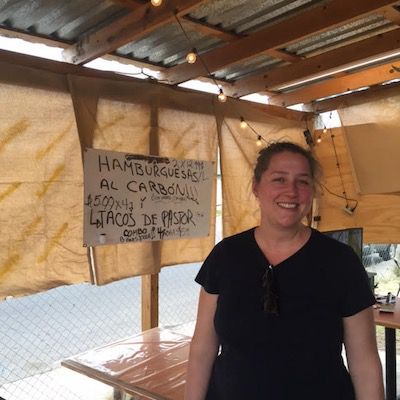
Jill McDonough
Poetry
Jill McDonough’s books of poems include Habeas Corpus (Salt, 2008), and Where You Live (Salt, 2012). The recipient of three Pushcart prizes and fellowships from the Lannan Foundation, NEA, NYPL, FAWC, and Stanford, her work appears in Slate, The Threepenny Review, and Best American Poetry. She directs the MFA program at UMass-Boston and 24PearlStreet, the Fine Arts Work Center online. Her fourth poetry collection, REAPER, is forthcoming from Alice James Books.
Enchantment
We’re in Eberswalde, where they burned
the synagogue on Kristallnacht, where Ravensbrück
had a subcamp. After the war the East made it into
a club. A perfectly good building; why tear it down?
Before the band plays we walk through, beyond
the Christmas-lit bar, bright stage, to a dark room
of upturned leather club chairs: I think
of lampshades made of human skin.
Darker corridors and doorways, sunken
cardboard boxes, moldy overhead projector.
The doors are heavy. Concrete absorbs
all sound, though we’re only rooms away
from the DJ, dancers, happy hour.
In one room we find thirteen sewing machines,
oak tables. I imagine they’re the women,
under some enchantment. Freed from body,
breath, made into this, and we’re come here
to save them. The music starts at ten.
Kids who come to see the show have shaved heads,
drab jackets, combat boots, tattoos. I’m through,
I’m thinking, want to fly home, cart off
the sewing machines. Scrub one sewing machine
with brushes, steel wool, Murphy’s Oil Soap.
Rub warmed linseed oil in the table’s thirsty grain,
let oak, enamel rest, soak it in on sheets of Sunday’s
New York Times. The stoves are lit for hours,
but we still see our breath. The whitewash, disco
balls, and colored lights are new, but it was cold like this
for them. Our visible breath historically accurate.
We are burning all the coal we want.
the synagogue on Kristallnacht, where Ravensbrück
had a subcamp. After the war the East made it into
a club. A perfectly good building; why tear it down?
Before the band plays we walk through, beyond
the Christmas-lit bar, bright stage, to a dark room
of upturned leather club chairs: I think
of lampshades made of human skin.
Darker corridors and doorways, sunken
cardboard boxes, moldy overhead projector.
The doors are heavy. Concrete absorbs
all sound, though we’re only rooms away
from the DJ, dancers, happy hour.
In one room we find thirteen sewing machines,
oak tables. I imagine they’re the women,
under some enchantment. Freed from body,
breath, made into this, and we’re come here
to save them. The music starts at ten.
Kids who come to see the show have shaved heads,
drab jackets, combat boots, tattoos. I’m through,
I’m thinking, want to fly home, cart off
the sewing machines. Scrub one sewing machine
with brushes, steel wool, Murphy’s Oil Soap.
Rub warmed linseed oil in the table’s thirsty grain,
let oak, enamel rest, soak it in on sheets of Sunday’s
New York Times. The stoves are lit for hours,
but we still see our breath. The whitewash, disco
balls, and colored lights are new, but it was cold like this
for them. Our visible breath historically accurate.
We are burning all the coal we want.
Listen:
